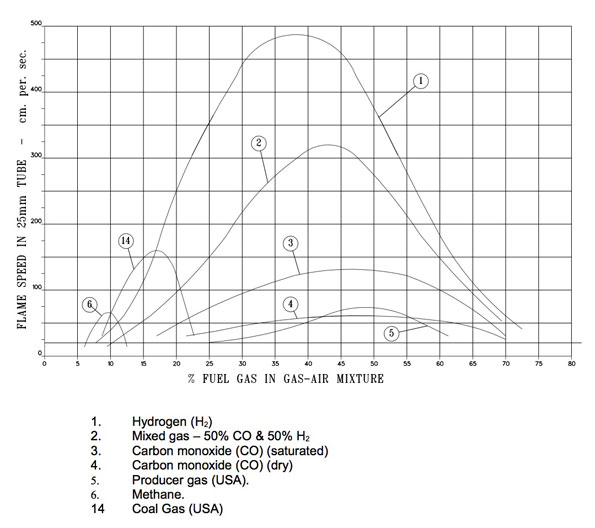It is well known in the scientific community that hydrogen has a very high flame speed, Much higher than all other known gases. The following chart show the flame speed of various gases including hydrogen.
THE DIAGRAM IS INTENDED TO ILLUSTRATE THE RELATIVE PROPERTIES OF HYDROCARBON CASES SUCH AS METHANE, WITH HYDROGEN AND COMMON MANUFACTURED GASES. THE INFORMATION IS ONLY INTENDED TO INDICATE THE RELATIVE PROPERTIES OF GASES TO EACH OTHER AND TO BE USED FOR GENERAL EDUCATION PURPOSES.

Because hydrogen has such a high flame speed, adding hydrogen to the air-fuel mixture increases the Laminar Flame Speed of the fuel being burned. The Laminar Flame Speed is a property of a combustible mixture and is defined as the speed at which an un-stretched laminar flame will propagate through a quiescent mixture of unburned reactants.
For a visual perspective of the flame speed of hydrogen, the following video is very instructive. It helps in understanding why hydrogen is able to speed up the flame speed of other fuels.
Scientific Research & Testing
Studies at The Massachusetts Institute of Technology (MIT) and Princeton (among many, many other) have proven a relationship between adding hydrogen to the air-fuel mixture of many fuels and improved combustion efficiency.
 The Princeton Study entitled Further Study on Effects of Hydrogen Addition on Laminar Flame Speeds of Fuel-Air Mixtures concluded there was almost a linear relationship between hydrogen addition and flame speed increase for ethylene, ethane and acetylene as had been shown in other studies for methane, propane and n-butane.
The Princeton Study entitled Further Study on Effects of Hydrogen Addition on Laminar Flame Speeds of Fuel-Air Mixtures concluded there was almost a linear relationship between hydrogen addition and flame speed increase for ethylene, ethane and acetylene as had been shown in other studies for methane, propane and n-butane.
 The MIT study concluded, among other things that pure hydrogen addition increases the in-cylinder laminar propagation speed of methane by ~20%.
The MIT study concluded, among other things that pure hydrogen addition increases the in-cylinder laminar propagation speed of methane by ~20%.
These are just two of the many studies that have shown the effect that hydrogen has on increasing flame speed or burn rate and thus combustion efficiency. These studies can be downloaded from this website.
Obviously, there is a clear scientific basis for what we have observed in our testing, which is, that Hydrogen increases the burn rate and combustion efficiency of practically all fuels used for combustion.
 All engine testing of the LeefH2 has been in EPA approved labs using EPA approved testing protocols. The lab, Olson-EcoLogic, in Fullerton Ca, has received compliance recognition from the California Air Resources Board (CARB), the U.S. Environmental Protection Agency (EPA), and the Texas Commission of Environmental Quality (TCEQ).
All engine testing of the LeefH2 has been in EPA approved labs using EPA approved testing protocols. The lab, Olson-EcoLogic, in Fullerton Ca, has received compliance recognition from the California Air Resources Board (CARB), the U.S. Environmental Protection Agency (EPA), and the Texas Commission of Environmental Quality (TCEQ).